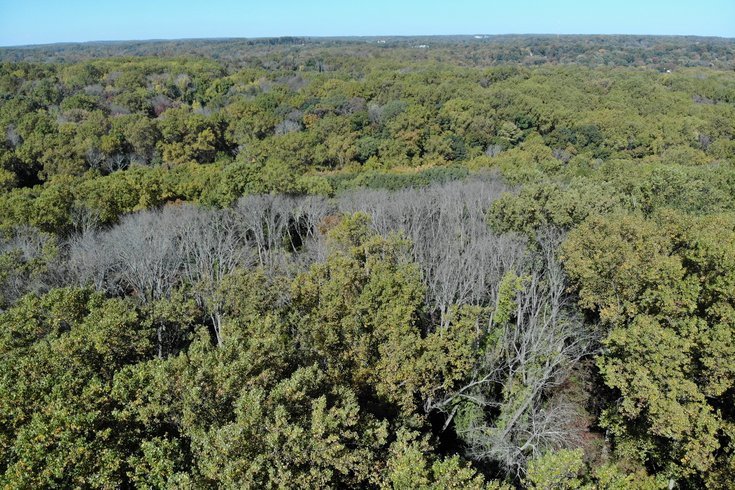
March 20, 2024
 Provided Image/Tyler Arboretum
Provided Image/Tyler Arboretum
Tyler Arboretum has removed hundreds of ash trees on its grounds that were damaged by the invasive emerald ash borer beetle. The public garden in Delaware County will reopen 11.5 miles of trails on the affected land on April 7.
The Tyler Arboretum in Delaware County is preparing to reopen a series of trails that were shut down last summer because of the invasive emerald ash borer, a destructive beetle that wreaks havoc on ash trees.
Starting April 7, the nonprofit, public garden in Middletown Township said it will restore access to about 11 1/2 miles of trails outside its 100-acre fenced area. In all, the arboretum closed about 17 miles of trails last year in order to allow crews to clear ash trees that had been damaged by the insects.
Emerald ash borers, native to Asia, were first recorded in the United States in 2002 in Michigan. The species has since spread to at least 36 states, creating an ecological crisis in many public and private environments. When the green beetles lay their eggs in the cracks between the bark of ash trees, the larvae burrow inside until they reach maturity. The leaves of the trees begin to wilt and their canopies thin as the trees become weakened and pose a hazard to public safety. Infestations kill about 99% of trees within three to four years.
Since Tyler Arboretum first noticed the telltale signs in early 2022, about 1,600 dead and hazardous trees were identified in the lands that lie outside the deer enclosure fence. The public garden, which is listed on the National Register of Historic Places, spans a total of about 650 acres.
Tree removal began last year and was funded by a combination of reserves and private donations. The final phase of the project will be paid for by a grant from the Pennsylvania Department of Conservation and Natural Resources. The total cost of the tree removal is estimated to be around $500,000.
Over the coming year, Tyler Arboretum plans to work on additional hazard removal and trail stabilization. By next year, the goal is to replant a large number of trees in areas that had large concentrations of ash.
Other methods of fighting emerald ash borer infestations include insecticides and a species of stingless, parasitic wasp that feeds on the beetle's larvae and eggs. Tyler Arboretum determined chemical treatments were too costly given their uncertain results, and the damage was too far along for wasp programs to be of benefit at this stage. It's expected that the vast majority of ash trees at the arboretum will not survive.
The opening of 11 1/2 miles of trails in April is expected to come just in time for spring blooms and seasonal wildflower displays. A timeline hasn't yet been set for the reopening of the remaining trails.